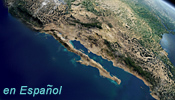Reviews
The Washington Post
The closest you'll ever get to scuba diving without getting wet is watching "Ocean Oasis," the ravishing new Imax film opening today at the National Museum of Natural History. But you could dive your way halfway around the world and never witness the submarine poetry—and predation—the film documents so majestically in Mexico's Sea of Cortes.
Working with a cinematic sophistication and a visual elegance Jacques Cousteau would have killed for, producer-director Soames Summerhays waltzes us up and down the oceanic food chain in awe, from blizzards of reef-born plankton to vast silver rivers of frigate mackerel to pods of cavorting humpback whales, and manta rays the size of small planes.
It's the same sort of subject matter treated regularly on TV's nature shows, but you've never seen it like this. It's not just the big-as-a-house Imax screen that mesmerizes, or the jewellike clarity of the images thereon; it's the way everything works together, including composer Alan Reeves's evocative score, to make "Ocean Oasis" a bath for the senses.
continued ...
Ken Ringle,
Washington Post Staff Writer
Wednesday, September 13, 2000; Page C01
The San Diego Union-Tribune
Multi-colored clouds of fish flow in gentle swirls against a turquoise background, while ghostly gray sharks slide by in alarming proximity.
Change scene to a barren beach of gray rocks and beige sand, covered at one point by a football field-size sea of nesting terns, surrounded by thousands of poaching gulls.
Change again to a breathtaking aerial sweep across towering cliffs of naked, wind-sculptured rock, then down into deep narrow canyons where rows of spindly palms find fragile life at the edge of a thin stream.
These are but a few of the images of dazzling beauty and grandeur provided in a film extolling the amazing biological and geological diversity of the Baja Peninsula and the Sea of Cortez ...
Otto Kreisher, Copley News Service
Saturday, September 30, 2000; Page E7
Comments from conservation organizations
Conservation International
Ocean Oasis is a film that invites the viewer to both enjoy and profoundly reflect on the future of one of the most splendid natural jewels of the planet, the Gulf of California. Throughout a series of masterful shots, the public becomes totally immersed in the heart and nature of the Sea of Cortés to unravel the countless mysteries and secrets of what appears to be an inexhaustible source of life.
Through its on-screen participants and its leading scientist, Exequiel Ezcurra—all real actors of scientific research and conservation in this unique area—the film succeeds not only in conveying information to the audience, but also in educating the viewer on the complex and delicate ecological processes that surround this fragile marine ecosystem.
Without a doubt, Ocean Oasis awakens the spirit of adventure and exploration that exists in each human being and invites us to discover this sea. Its sequences and its messages generate in the viewer a desire to know more about the region, to care for it and protect it, to make it survive in time. It leads us to discover and rediscover, again and again, the Sea of Cortés in the same way that this wonderful sea revealed itself to the first explorers.
Ocean Oasis conveys, in its natural beauty, the greatest conservation message that any audience can receive.
Alejandro Robles
Executive Director, Conservation International Mexico
Mexican Nature Conservation Fund—Fondo Mexicano para la Conservación de la Naturaleza
The Mexican Nature Conservation Fund shares with other environmental groups the common goal of raising the public's awareness of the need to protect the earth's natural resources. Our environment is not just another factor to be considered. It is the fabric that enfolds, sustains, provides and nurtures the world economy. Ecosystems are indispensable for the support of life, and essential to our wellbeing. They provide environmental services, as well as recreation.
Ocean Oasis takes us on a magnificent journey through the Gulf of California. It shows us its outstanding landscapes and biological richness, and strengthens our commitment to conserve this unique ecosystem of global importance.
Lorenzo Rosenzweig, M.Sc.
Executive Director, The Mexican Nature Conservation Fund
The Nature Conservancy
This is a film that finally lives up to the promise of [large-format
films], with a script that delivers a story as strong as the images themselves. The result is awe-inspiring entertainment with genuine educational value....
The Sea of Cortés rates as one of the most significant marine ecosystems on our planet, and The Nature Conservancy has designated it as one of the world's Last Great Places. Ocean Oasis conveys in the most compelling terms the reasons why this place has become such a high priority for conservation. It presents a riveting picture of the diversity of the life found both in and around the Sea. We learn not only of the complex interactions among these creatures but of the natural forces that shape it all. The information comes so well timed and clearly stated that it gives the viewer an almost intuitive sense of understanding. Ocean Oasis provides an excellent example of how science can be highly entertaining....
For the viewer, Ocean Oasis also proves evocative. Allowing the comments of the naturalists like Dr. Ezcurra to carry the story was brilliantly effective. The film offers a very genuine sense of excitement and passion, not to mention authoritative knowledge. It has a conservation message that is positive, hopeful and inspiring. Ocean Oasis is a beautiful celebration of the Sea of Cortés. All natural history films should be produced this well.
![[Ocean Oasis - Media and Reviews]](images/bnr-media.gif)

![[Ocean Oasis - Media and Reviews]](images/bnr-media.gif)

